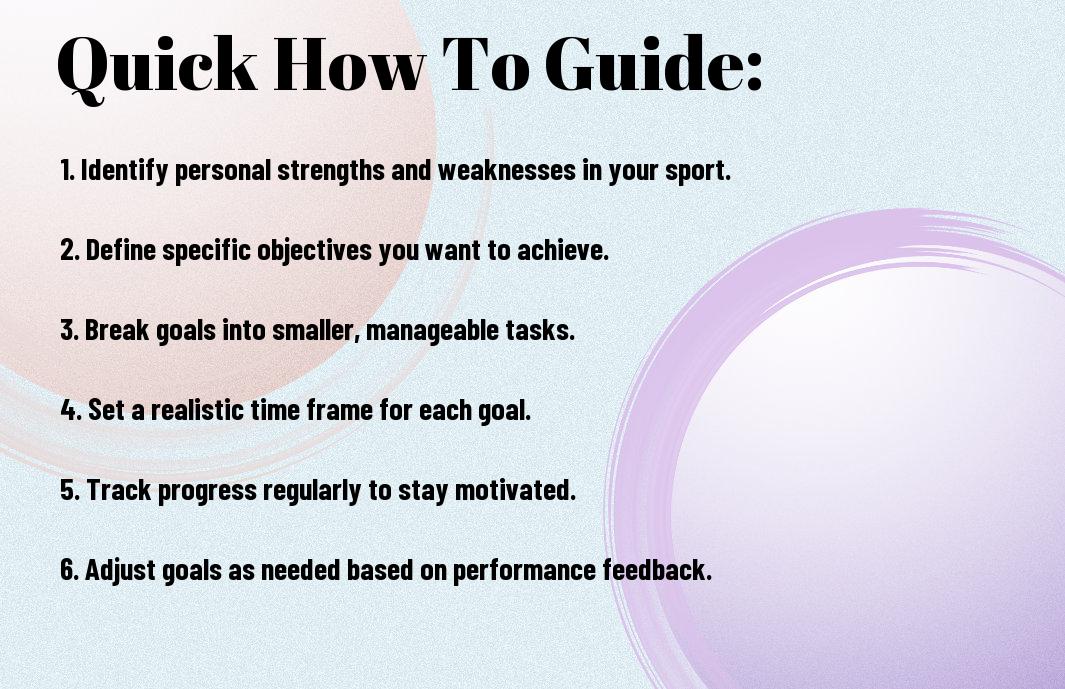Just like in any other aspect of life, setting achievable goals in sports can significantly enhance your performance and motivation. By focusing on specific, measurable, and realistic objectives, you can track your progress and stay committed to your training regime. This guide will walk you through the vital steps to define your goals effectively, ensuring they align with your personal aspirations and abilities. Transform your approach to sports by learning how to set goals that inspire you and foster continuous improvement.
Key Takeaways:
- S.M.A.R.T. Criteria: Goals should be Specific, Measurable, Attainable, Relevant, and Time-bound to enhance clarity and focus.
- Break Down Objectives: Divide larger goals into smaller, manageable tasks to maintain motivation and track progress effectively.
- Regular Evaluation: Frequently assess your progress to identify areas for improvement and adjust strategies as necessary.
- Stay Flexible: Be prepared to adapt your goals in response to unexpected challenges or changes in circumstances.
- Positive Reinforcement: Celebrate small victories and achievements to boost morale and sustain commitment toward reaching long-term goals.
Understanding the Importance of Goals in Sports
The role of goals in sports cannot be overstated. Goals provide direction and purpose, helping you focus your energy and efforts on what truly matters in your athletic journey. By setting clear objectives, you can measure your progress and stay motivated, ultimately enhancing your overall performance and enjoyment of the sport.
The Role of Goals in Performance
To achieve peak performance, you must establish concrete goals. These objectives act as benchmarks that allow you to assess your development and refine your training strategies. With clearly defined goals, you can maintain focus, push your limits, and celebrate your achievements along the way.
Benefits of Setting Achievable Goals
Performance improves significantly when you set achievable goals. These goals help you break down larger ambitions into manageable steps, making your path to success feel less daunting. Additionally, setting realistic goals boosts your confidence, keeps you engaged in training, and encourages a greater sense of accomplishment as you reach each target.
Setting achievable goals allows you to enjoy a sense of progress and fulfillment in your athletic pursuits. As you accomplish smaller milestones, your motivation increases, creating a positive feedback loop that drives you to improve further. Achievable goals also make it easier to adapt and adjust your training plans based on your evolving capabilities, ensuring that you remain challenged yet not overwhelmed. By focusing on attainable objectives, you cultivate a growth mindset that ultimately enhances your overall sports experience.

How to Set Achievable Goals
While setting achievable goals in sports, it’s vital to ensure they are realistic and attainable within your current abilities and resources. Break down your larger aspirations into smaller, manageable steps that serve as building blocks toward your ultimate objective. This approach allows you to monitor your progress and adjust your strategies, keeping your motivation high as you celebrate each milestone along the way.
Defining SMART Goals
To effectively pursue your sports ambitions, you should define your goals using the SMART criteria: Specific, Measurable, Achievable, Relevant, and Time-bound. By crafting goals that meet these characteristics, you create a clear roadmap that enhances your focus and increases your chances of success in your athletic journey.
Aligning Goals with Personal Values
SMART goals should resonate with your personal values to keep you motivated and passionate about your pursuits. When your goals reflect what matters most to you—be it teamwork, perseverance, or personal excellence—you’ll find the drive to push through challenges and stay committed to your training.
This alignment not only helps you stay engaged in your sport but also reinforces your identity as an athlete. When your goals reflect your core beliefs, you cultivate a deeper sense of purpose, which can enhance your performance and overall satisfaction in your athletic journey. Prioritizing personal values ensures that each effort contributes to your growth, making the process genuinely rewarding.
Tips for Staying Motivated
All athletes face obstacles on their path to success, but staying motivated can make all the difference. Here are some key tips to keep your spirits high:
- Set clear, short-term goals to maintain focus.
- Visualize your success regularly.
- Track your progress to see how far you’ve come.
- Surround yourself with positive influences.
- Stay adaptable and adjust your goals as needed.
After all, motivation is a journey, not a destination.
Creating a Support System
For achieving your sports goals, building a strong support system is vital. Seek out coaches, teammates, friends, or family members who inspire and encourage you. Sharing your ambitions with others fosters accountability, and their constructive feedback can provide valuable insights. Their support can help you overcome challenges and keep you motivated throughout your journey.
Celebrating Small Wins
Wins, no matter how minor they may seem, deserve recognition and celebration. These small victories contribute significantly to your overall progress and help maintain your motivation levels. Acknowledging what you’ve achieved reinforces positive behavior and reminds you that growth often occurs in incremental steps.
Systematically celebrating small wins can elevate your motivation and commitment. Whether it’s hitting a training milestone, perfecting a technique, or staying consistent for a week, take time to acknowledge these accomplishments. You can reward yourself with small treats or simply take a moment to reflect on your progress, reinforcing the habit of celebrating every step of the journey.
Factors to Consider When Setting Goals
Not all goals are created equal; you must consider various factors to ensure they align with your aspirations. Here are some key points to guide you:
- Your current skill level
- Time availability for training
- Your motivations and passions
- The resources at your disposal
- Potential obstacles you might encounter
After weighing these factors, you can set goals that are not only attainable but also aligned with your long-term vision.
Assessing Current Skills and Abilities
Abilities play a significant role in determining the types of goals you can realistically pursue. Begin by evaluating your current skill set, including strengths and weaknesses in your chosen sport. This self-assessment helps you identify areas that require improvement and allows you to create goals that are tailored to your unique capabilities.
Understanding the Competitive Landscape
Assessing the competitive landscape is vital for effective goal setting. This involves looking at the skill levels of other athletes in your field, the standards of performance in your sport, and the trends in competition. By understanding where you stand relative to others, you can set benchmarks that challenge you while remaining realistic.
To navigate the competitive landscape successfully, make sure to analyze not only the current competitors but also the historical context of your sport. Trends may shift over time, and acknowledging these changes can offer insight into what it takes to succeed now. Being informed about the competition can enable you to set strategic goals that push you to grow and excel without setting yourself up for unnecessary strain.

Adjusting Goals as Needed
Despite your best efforts to set achievable goals in sports, the need to adjust them may arise. Changing circumstances, such as injuries or shifts in performance, can influence your ability to meet your targets. It’s vital to remain flexible and consider reassessing your goals throughout your training. This approach not only helps maintain motivation but ensures that you stay aligned with your current capabilities and long-term aspirations.
Recognizing When to Reevaluate
The ability to recognize when to reevaluate your goals is vital for sustained progress. Regularly assess your performance, noting any challenges or setbacks you encounter. If you find yourself consistently missing targets or feeling overwhelmed, it may be time to reconsider your goals, ensuring they remain relevant and attainable.
Adapting Strategies for Improvement
With each evaluation, you will likely need to adapt your strategies for improvement. This can involve altering your training regimen, seeking additional resources, or adjusting your mindset. Staying open to change will enhance your progression and help maintain motivation.
For instance, if you find that specific drills are not yielding the desired results, you might explore alternative exercises or techniques better suited to your skill level. You could also consider enlisting a coach or mentor for personalized guidance and support. By embracing flexibility and seeking new strategies, you’ll create a more effective training plan that aligns with your evolving goals.
Common Pitfalls to Avoid
For athletes aiming to improve, it’s crucial to be aware of common pitfalls that can hinder your progress. Many individuals inadvertently set themselves up for failure by not recognizing these obstacles. By steering clear of these mistakes, you can achieve your sports goals more efficiently and effectively.
Setting Unrealistic Expectations
Now, you might be tempted to aim for what feels like extraordinary achievements, but setting unrealistic expectations can lead to disappointment and frustration. It’s vital to ensure your goals are attainable based on your current skill level, physical condition, and available training time.
Ignoring the Importance of Flexibility
Unrealistic expectations can often blind you to the necessity of flexibility in your goal-setting process. Life is dynamic, and factors such as injuries, changes in schedule, or even shifts in motivation can arise unexpectedly.
This flexibility allows you to adapt your goals and strategies as circumstances change, ensuring that you remain focused and resilient. Embracing a flexible mindset enables you to navigate setbacks without losing sight of your overall objectives. Rather than rigidly sticking to a plan that may no longer serve you, adjust your goals to maintain your progress and motivation in sports.
Final Words
To wrap up, setting achievable goals in sports is vital for your continued growth and motivation. By using the SMART criteria—Specific, Measurable, Achievable, Relevant, and Time-bound—you can clarify your objectives and track your progress effectively. Break down larger goals into smaller, manageable steps, and regularly review your achievements to stay focused. Surround yourself with supportive teammates or coaches to maintain accountability and encouragement. Ultimately, your journey in sports will be more fulfilling when you set realistic and attainable goals that inspire you to push your limits while celebrating your successes.
Q: Why is it important to set achievable goals in sports?
A: Setting achievable goals in sports is important because it provides clear direction and motivation. When athletes establish realistic objectives, they can track their progress more effectively and celebrate small victories along the way. This process helps build confidence and fosters a positive mindset, which is necessary for long-term success. Additionally, achievable goals minimize frustration and promote a sense of accomplishment, encouraging athletes to stay committed to their training and performance.
Q: How can I identify realistic goals for my sport?
A: To identify realistic goals, start by evaluating your current skill level and understanding the demands of your sport. Break down your long-term aspirations into smaller, measurable objectives that can be achieved within a set timeframe. Consider factors such as your training schedule, physical capabilities, and available resources. Additionally, consulting with a coach or mentor can provide valuable insights into setting appropriate goals tailored to your unique abilities and aspirations.
Q: What strategies can I use to stay motivated while pursuing my sports goals?
A: Staying motivated requires a combination of strategies. First, visualize your goals and the outcomes you wish to achieve, as this can keep you focused on your objectives. Create a detailed plan that includes specific milestones and timelines to monitor your progress. Surround yourself with a supportive community, such as teammates or coaches, who can encourage you and offer constructive feedback. Lastly, celebrate your achievements, no matter how small, as this reinforces your motivation and commitment to your goals.

